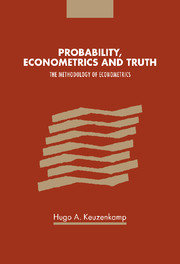Book contents
- Frontmatter
- Contents
- Introduction
- 1 The philosophy of induction
- 2 Probability and indifference
- Intermezzo: a formal scheme of reference
- 3 Relative frequency and induction
- 4 Probability and belief
- 5 The theory of simplicity
- 6 From probability to econometrics
- 7 Econometric modelling
- 8 In search of homogeneity
- 9 Positivism and the aims of econometrics
- 10 Probability, econometrics and truth
- Personalia
- References
- Name Index
- Subject Index
10 - Probability, econometrics and truth
Published online by Cambridge University Press: 22 September 2009
- Frontmatter
- Contents
- Introduction
- 1 The philosophy of induction
- 2 Probability and indifference
- Intermezzo: a formal scheme of reference
- 3 Relative frequency and induction
- 4 Probability and belief
- 5 The theory of simplicity
- 6 From probability to econometrics
- 7 Econometric modelling
- 8 In search of homogeneity
- 9 Positivism and the aims of econometrics
- 10 Probability, econometrics and truth
- Personalia
- References
- Name Index
- Subject Index
Summary
Your problems would be greatly simplified if, instead of saying that you want to know the ‘Truth,’ you were simply to say that you want to attain a state of belief unassailable by doubt.
C. S. Peirce (1958, p. 189)Introduction
The pieces of this study can now be forged together. The first chapter introduced the problems of induction and Humean scepticism. Different responses to scepticism were mentioned: naturalism, apriorism, conjecturalism and probabilism. In the remaining chapters, I analysed the foundations of a probabilistic approach to inference. Rival interpretations of probability were presented and their merits compared. I provided arguments as to why I think apriorism and conjecturalism are not satisfactory, although I do not deny that the probabilistic approach is problematic as well.
Chapter 3 discussed the frequency approach to probabilistic inference, chapter 4 considered the epistemological (Bayesian) perspective. Although the logical foundations of the frequency approach to probabilistic inference are problematic, probability theorists have been able to develop an impressive box of tools that are based on this interpretation. Unsatisfactory philosophical foundations do not necessarily prevent a successful development of a theory. On the other hand, the logically more compelling epistemological approach has not been able to gain a strong foothold in applied econometric inference. Econometricians have difficulties in specifying prior probability distributions and prefer to ignore them. Still, they tend to give an epistemological interpretation to their inferences. They are Bayesian without a prior.
Information
- Type
- Chapter
- Information
- Probability, Econometrics and TruthThe Methodology of Econometrics, pp. 262 - 275Publisher: Cambridge University PressPrint publication year: 2000
